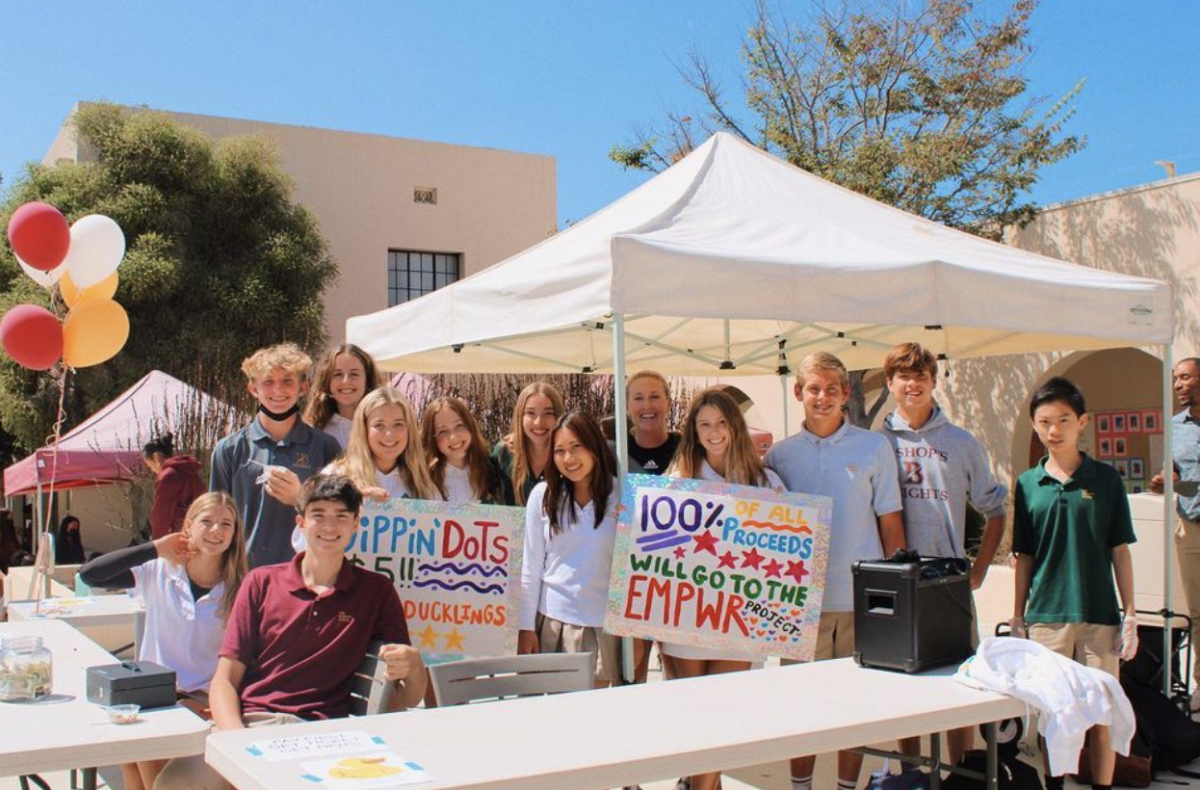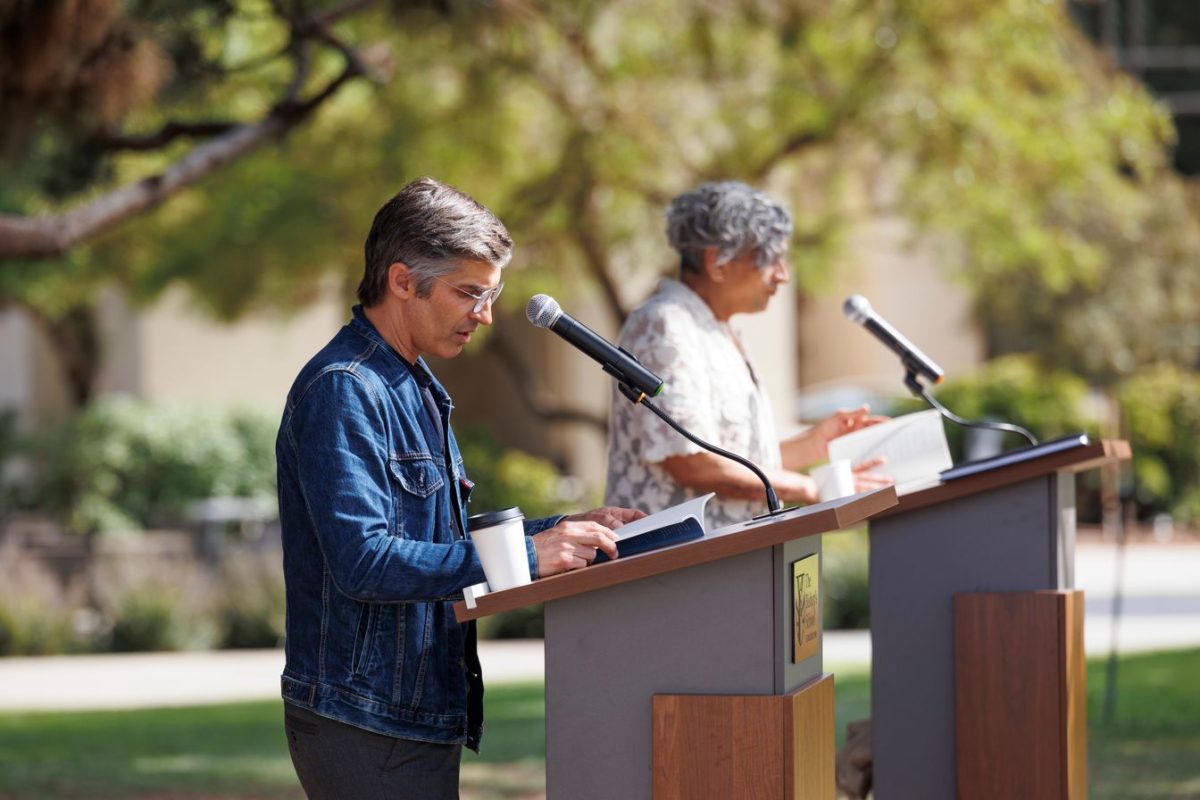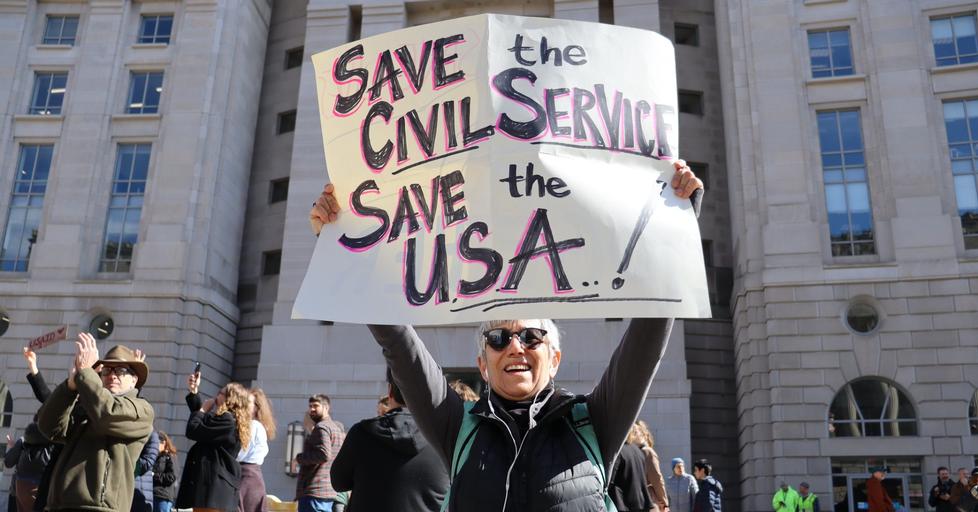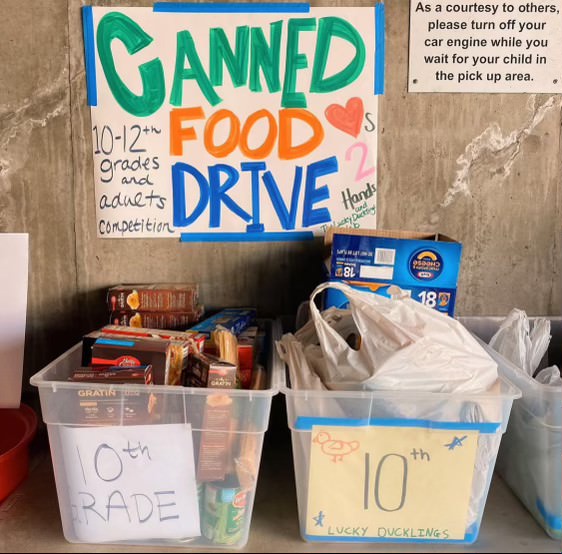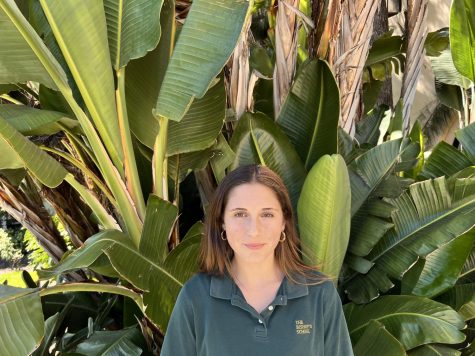It’s finally lunch. You walk up to the terrace to get in the line but something catches your attention — a tent, a few colorful posters, and a group of your peers asking if you’d like to buy a brownie.
There always seems to be a bake sale set up on the terrace at both Middle and Upper School lunches — but that will soon no longer be the case.
In fact, just next year, service club bake sales and fundraisers could disappear altogether.
Last semester, there were six bake sales, one in September, one in October, one in November, and three in December. These were hosted by Community Service Initiative (CSI), Urban Surf and Kids, the Lucky Ducklings, Student Environmental Aquatic Activists (SEAA), and the Bishop’s library. On the contrary, there have only been two bake sales since this past January, hosted by Lucky Ducklings and Project Arise, both in February 2024.
Bake sales provide an avenue for students to share their passion for change while engaging the entire community in making a difference, no matter how big or small. It would be a hasty — and potentially harmful — move to get rid of them altogether.
Reasons for Change:
The Tower initially contacted the Director of Marketing and Communications Ms. Cathy Morrison, Associate Head of School Mr. Michael Beamer, and Chief Advancement Officer Ms. Emily Hassig to better understand the ban, however, all three redirected us to The Reverend.
The decision to end fundraising events for service clubs on campus does not correlate with the recent tuition increase or comprehensive campaign, School Chaplain The Reverend Nicole Simopoulos-Pigato and Mr. Beamer confirmed. The Reverend added, “Mrs. Emily Hassig and the Development Office don’t have anything to do with on-campus fundraisers. Their focus is raising funds for the School.” Mrs. Hassig confirmed this in an email as well.
The Reverend Simopoulos-Pigato noted that the “small amount of money you raise in a bake sale is not going to impact any strategic planning on the part of the School.”
Restrictions Due to the School’s Nonprofit Status:
The Bishop’s School is a 501(C)(3) nonprofit organization, meaning it has a tax-exempt status, as long as it adheres to the requirements, according to the Internal Revenue Service (IRS). The Reverend stated, “Because of our non-profit status, we need to be mindful of raising money for other organizations.”
The School must not be organized to benefit any private interests, shareholders, or individuals, and the ability to politically lobby is restricted, according to the IRS.
It is important to note that nonprofit organizations can donate to other nonprofit organizations, according to JD Supra LLC, an organization that provides legal counsel. However, the School must adhere to all the terms listed above when doing so, otherwise, their tax-exempt status could be revoked.
Despite our attempts to confirm the specific requirements with the Business Office, and on the IRS website, the exact guidelines remain difficult to identify. It’s understandable that the School needs to adhere to requirements to maintain a nonprofit status. However, this obscurity brings us to question the sweeping decision to prohibit all fundraisers by service clubs.
Alignment with Mission, Vision, and Values:
According to The Reverend Simopoulos-Pigato, she and Director of Service and Social Innovation Ms. Jacqueline Gomez (who declined to comment) are spearheading the change to the Service and Social Innovation Program. The Service and Social Innovation Program engages students in service work, such as participating in food or clothing drives, researching issues, and advocating for environmental change.
The Reverend explained that the decision to change the bake sale culture came from discussions she had with Ms. Gomez. Reflecting on the many fundraising events (such as bake sales and the Lucky Ducklings’ Spikeball Tournament — also prohibited moving forward), Ms. Gomez and The Reverend Simopoulos-Pigato saw that these events do not align with the School’s Service and Social Innovation Program, or the School’s mission, vision, and values.
Additionally, The Reverend noted that fundraising by service clubs does not align “with our mission and values and our main purpose, which is education.”
The School does fundraise with annual events, like the Gala and the Bishop’s Fund. These events raise financial aid funds to provide educational opportunities, therefore aligning with the mission, noted The Reverend Simopoulos-Pigato. According to the School’s website, it “allocates more than $4.9 million in financial aid and ancillary expenses to 20 percent of our student body.”
Philanthropy and Service Go Hand-in-Hand:
Another factor shifting the program away from fundraising is that the program is a service program, not a philanthropy program.
Philanthropy, as the Cambridge Dictionary defines it, is generally the action of donating money to those in need. In contrast, service is the action and time someone spends working with an organization. Service tends to be hands-on and fosters a deeper connection with those helped.
The Reverend explained, “Our service program doesn’t exist to raise money for organizations that students care about,” but rather, the program is “meant to empower students to get out into the community and be actively involved with those organizations through volunteer efforts and giving their time and talents.”
Although the program is a service program rather than a philanthropy one, why can’t it have aspects of philanthropy? The two go hand-in-hand when it comes to helping the disadvantaged and making an impact. Additionally, the program has existed as a philanthropy-service program for several years.
Reese Cohen (‘24), a member of Madcaps, a mother-daughter service and philanthropy organization in Point Loma, said that bake sales “make it easier for everyone to get involved,” in making a difference.
Lily agreed and said, “I think that bake sales certainly need to be less of a focus for service clubs, and the frequency at which they occur should be lessened, but I’m not sure a total ban is the way to go about achieving this… Limiting the number of bake sales would be more effective than a complete ban.”
In addition to this, Reese proposed that “It would make more sense to require that there also be some sort of educational component to fundraising instead of taking away fundraising. Because it’s not benefitting anyone to take away funds from anyone who needs it.”
Can Fundraising Make a Difference? The Answer is Yes:
Bake sales are often held in addition to educational components or projects and events members of a club participated in outside of school.
For example, the Build a Miracle (BAM) club hosted a bake sale in February of 2023 to raise funds for items they would need to build houses. This bake sale fulfilled their club mission to build houses for impoverished families in Tijuana, Mexico. The bake sale supplemented activities they conduct outside of school. Through this bake sale, they were able to include the community in their effort and make students aware of the trip they were going to take to construct the houses.
Through these building trips, BAM members often connect with members of the family they are helping. BAM president Grace Dabir (‘24) said that “some of our families even call us during the holidays and keep up with us on social media and Messenger.” She added that she thought “the bake sale did help” to contribute to the fund for building houses “because anything helps.”
The Reverend and Ms. Gomez want to see students focusing more on creating a deeper connection. Grace shows that it can be possible to foster this connection like she described while also hosting fundraisers.
However, instead of fundraisers The Reverend and Ms. Gomez want to see students learning about the needs of those they are helping, researching the issues they are passionate about, “and more deeply thinking about what difference they [students] could make that could go deeper and have more of a long-term impact than just a few dollars,” said The Reverend.
Conversely, another student and a member of the Lucky Ducklings stated that they felt that the potential ban does not help anyone. (Several students were unwilling to comment on the record for fear their critical views would compromise their clubs’ work.)
Fundraising makes a difference, and it is a community event that all members can enjoy, whether that is raising money for good or purchasing a treat for oneself. Paulina Ai (‘24), agreed, as a consumer of baked goods. She added, “I think the ban is disappointing.”
The Reverend emphasized that the shift will encourage students to “think more creatively” about ways they can support organizations instead of turning to the “easy low-hanging fruit of a bake sale.” She also noted that unfortunately, “for these non-profits, the amount of money raised in a bake sale is so small that it doesn’t really make that much of a difference,” and although the organizations are grateful for the contributions, “we can have a much greater impact by doing [different] kinds of services.”
Students feel that the money raised makes a long-term impact. Mikayla Crowe (‘24), who often purchases baked goods from bake sales, observed that the events make “a lot of money that helps a lot of people, and it is unfair to take that away.” Additionally, she felt that the students who run bake sales often have “good intentions and are trying to raise money.”
The Reverend noted that the constant asking for donations can be stressful for parents, as she is one herself, and therefore the School “wants to make sure that we are not over-asking.”
As a leader of a service club, Students Demand Action (SDA), that has hosted bake sales I can understand this stress. In my club we offer different parts of the bake sale that club members can participate in, that is making signs, manning the table, and/or purchasing or baking goods. We do this so no club member feels pressured to spend money to contribute to the preparation of the sale. This can be easily instituted in all service clubs when it comes to the worry of “over-asking.”
Lily Gover (‘24), a leader the SDA and a member of the Lucky Ducklings Club, mentioned that bake sales are “an impactful but detached way of doing community service, and there are ways to help that have the same if not more of an impact,” she does not believe that fundraising should be banned entirely because it “is sometimes a good way to get people involved if doing other events is not feasible for some reason.”
Spencer Ralph (‘24), a member of Lucky Ducklings, agreed and expressed that he is “confused on how they will get kids to do service,” without bake sales as the accessibility of the on-campus clubs and service work they do at school is beneficial for students who sometimes find it difficult to make time on the weekends.
Lily said that bake sales are useful, but direct service “is much more motivating than simply paying a few dollars for a baked good for a cause that you often don’t stop to learn more about. They also make the same, if not more, of an impact.”
On the contrary, Spencer Ralph (‘24), a Lucky Ducklings club member, disagreed with Lily’s sentiment and argued that “these events actually get people to participate.” He added, “Yes, you may not have people learning about service through playing spikeball, but you do make an impact by raising hundreds of dollars.”
Bake sales make money — anywhere from $250 to over $700 — all of which makes a difference. For example, the club leaders for the Students Demand Action club reported that they made roughly $750 in a bake sale hosted for Wear Orange in June of 2023. Project Arise made $250 in cash and also an unknown amount of money from online pay in a bake sale for the San Diego River Park Foundation in February this year, according to club leaders. Club members of Build a Miracle Club reported that they made $443 in their bake sale in February of 2023.
I Know From Experience: Bake Sales Matter
I am the other leader and founder of SDA, which works to fight gun violence. Our club only hosts one major event per semester. In our first semester as a club, we hosted a bake sale, in addition to an educational video. The bake sale, in honor of Wear Orange (an event that honors survivors of gun violence), raised money for Everytown, our parent organization.
Last semester, we held a petition signing during lunch, where students received cookies and a pamphlet for signing a petition for gun reform of their choice. This semester, we had plans to host an informational session during lunch about how to use Stop the Bleed kits, or tourniquet kits, in case of emergency. We had aimed to partner this with a bake sale to fund Stop the Bleed kits for the School. School Nurse Kate Pe had alerted our club advisors that there were very few of these kits on campus.
Unfortunately, we were unable to move forward with the bake sale component, and the School bought more kits itself. This was disappointing to me and several members of the club who had planned out a bake sale and were excited to bring something to our campus that could save lives. Instead, the School took charge and funded more kits itself, taking an opportunity away from the club to engage the entire school community in learning about these life-saving kits as well as partaking in funding them.
Bake sales can help all sorts of causes, engage the entire community, and allow students to express their passion on campus. The ban of fundraisers entirely is doing more harm than good.
Other Forms of Community Service Besides Bake Sales:
The School wants the Service Program to inspire students to make a difference in their community and discover their method of creating change besides bake sales, according to a document that detailed Bishop’s official position. However, The Reverend does understand that the shift will be difficult because bake sales “have kind of been a [part of the] culture of our School.”
In the document authored by The Reverend and Ms. Gomez, they outlined other forms of service, which include: direct service, indirect service, advocacy, and research.
To read in more detail about the specificities of direct service, indirect service, advocacy, and research, as well as see examples of each please go to https://thebishopstower.com/.
So What’s Next?
Bake sales likely do not have a future at The Bishop’s School. While the change will be difficult for service clubs since bake sales are a major aspect of Bishop’s service culture, the goal is to make students realize that there are many other ways to engage in service. Indirect and direct service, advocacy, and research are just some of the ways students can support their passions and causes on a deeper level. The hope is that students will find this stronger connection and conduct very meaningful acts of service moving forward.
Despite the administration’s generalization, students know that bake sales and fundraisers make an impact, and there’s no doubt that this ban will affect the community. In a way not many may be happy about. Bake sales provide a way for the entire community to involve themselves in doing good, and enjoy a treat while doing it. Fundraising events should not be completely banned. Instead, the administration should aim to limit the number of fundraisers held by service clubs each semester.


